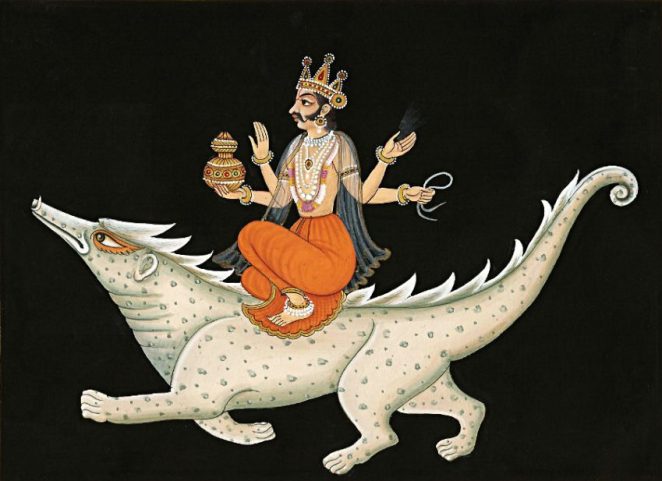The God of Oceans – Varuna
Varuna the God of Oceans is said to be the son of the sage Kashyapa. He rides the monster fish called Makara, which has the head and legs of an antelope. Varuna is a fair-complexioned man, and may have two to four hands and in one of his right hands he carries a noose. He possesses the lordship of the waters.
People worship him to bring the clouds and rain and also control the rain, thus he is known as the King of Water. He takes control of all the seas, oceans, rivers, lakes etc.
In Vedic times, the worship of Varuna fell off as he was overthrown by Indra as king of the gods. One possible reason for this may be traced back to Indra’s most famous exploit. Once Vritra (demon) stole all the waters of the universe of which Varuna was the King. It was Lord Indra who fought the demon and got the water back to the Universe. It may have been because of this that Indra was able to supersede the lordship of Varuna. Varuna then became God of the Oceans and Rivers; still important, but with hardly the glory he once had.

The God of War – Kartikeya
Kartikeya is the Hindu God of war. He is the leader of the army of the Devas. He is known by various names like Murugan, Shanmukha, Shadanana, Sarvana and Skanda. He is considered to be brave and intelligent as he is the God of War and Victory. He is believed to be the elder son of Lord Shiva and Goddess Parvati, also brother to Lord Ganesha. Kartikeya is said to have six heads, he has one hand in a charitable pose and other in a protective pose.
Over the time, Kartikeya has started losing importance in North India where he is referred to as Guardian Deity, however, in south he is still popular and associated with Deites like Murugan, Velam, and Seyyan. A passage in the Mahabharata talks of Agni’s faithless relationship with the six wives of the Rishis (ascetics), who symbolize the six stars in the constellation of Taurus forming the Indian Pleiades. The relationship resulted in the birth of Kartikeya.

The God of Wealth – Kubera
Kubera is the God of Wealth & is also known as Dhanpati. He is the “Treasurer of Gods” and “King of Yaksha”. Coming from the family of Lord Brahma, Kuber is the son of Vishrava and Illavida. He is also known as the Guardian of Wealth. Vishrava also married the demon princess Kaikesi, who had four children: Ravana, Kumbhakarna, Surpanakha and Vibhishana. So, logically speaking, Lord Kubera is also the half-brother of Ravana.
Lord Kubera is illustrated as fat and has dwarf body. He has 3 legs and only 8 teeth. Also known to have complexion like of lotus leaves and left eye being yellow, Lord Kubera is adorned with heavy jewelry and being the deity of wealth carries a pot or bag full of gold coins. He rides in “Pushpak- flying chariot”.
The God of Love – Kamadeva
Kamadeva is the Hindu God of Love and Passion, also known as “Indian Cupid”. He is considered to be fair and handsome, best looking among the gods. He carries a bow made of sugarcane and strung with a line of humming bees. He along with his wife, Rati (passion) and friend Vasanta (spring), decide for him when the arrow needs to be used. His vahan is “parrot”.
He is said to be the son of Lord Vishnu and goddess Lakshmi. He is surrounded by beautiful apsaras all the time and likes to wander in spring time. Lord Shiva burnt him to ashes for disturbing him in his meditation- Kamadeva did this so he can marry goddess Parvati. After the death of lord Kamadeva, love vanished from earth and hence lord Kamadeva was reborn as son to lord Krishna to bring back love and passion.

Shiva’s Vahana Nandi – The Bull
Nandi the bull is known as the vahana of Lord Shiva. He is known for his strength and tactics of fighting war. It is said that Ganesha- son of Lord Shiva learnt the art of fighting from Nandi. He is normally found in all Shiva temples either near the idol or facing it from a distance. Nandi is the bearer of truth and righteousness.

